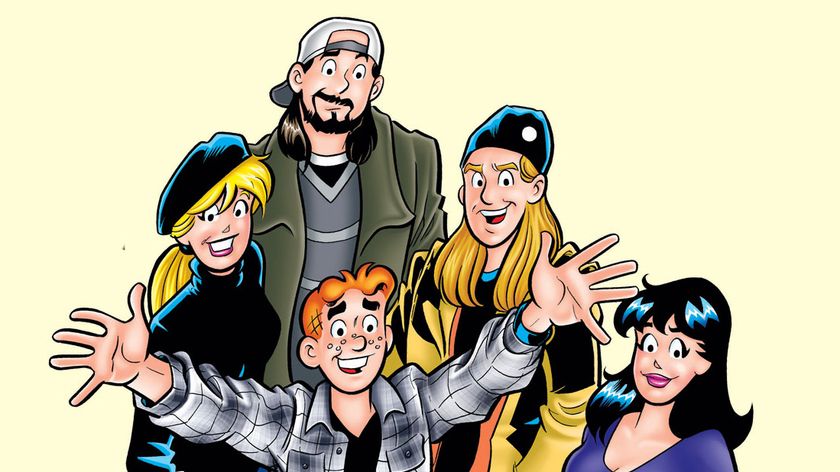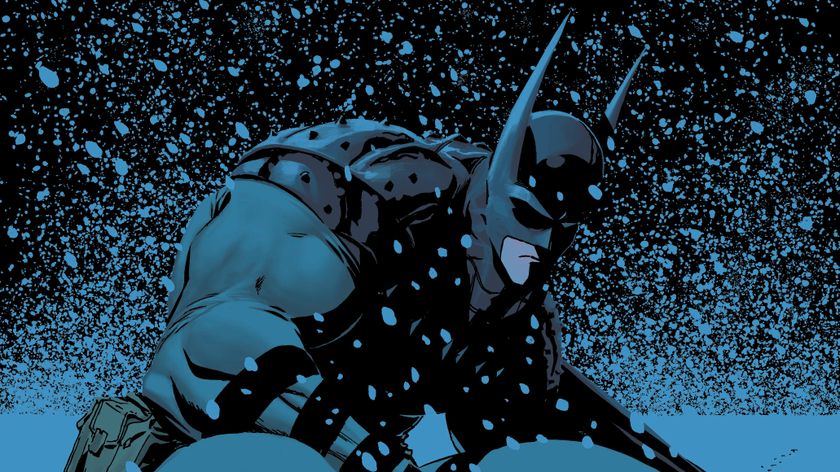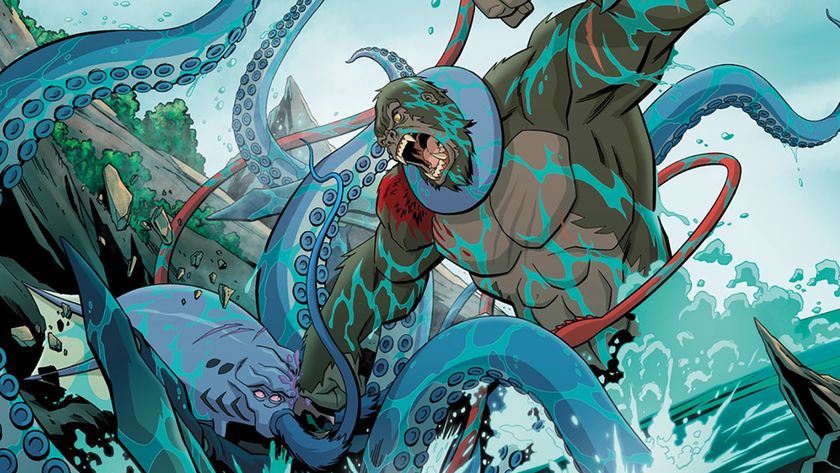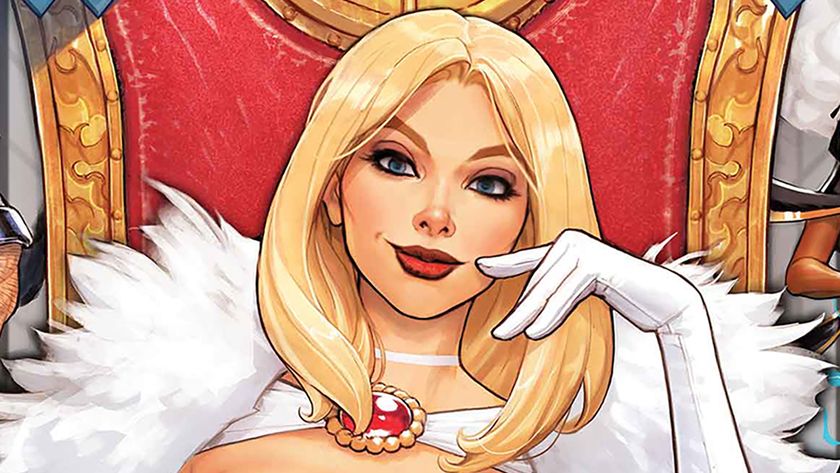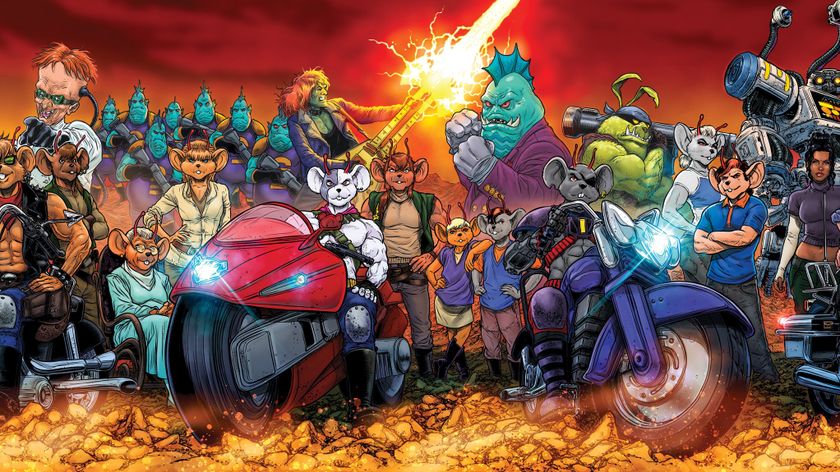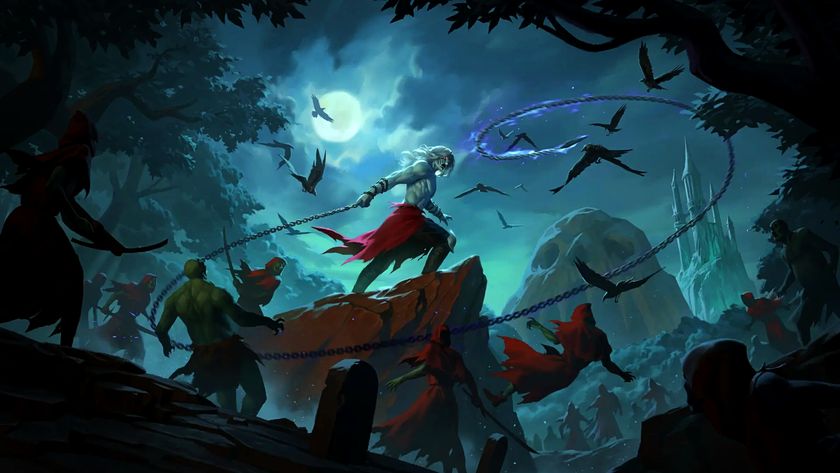The art of adapting The Adventure Zone podcast, ahead of The Crystal Kingdom's OGN debut
With six exclusive pages from Adventure Zone: The Crystal Kingdom
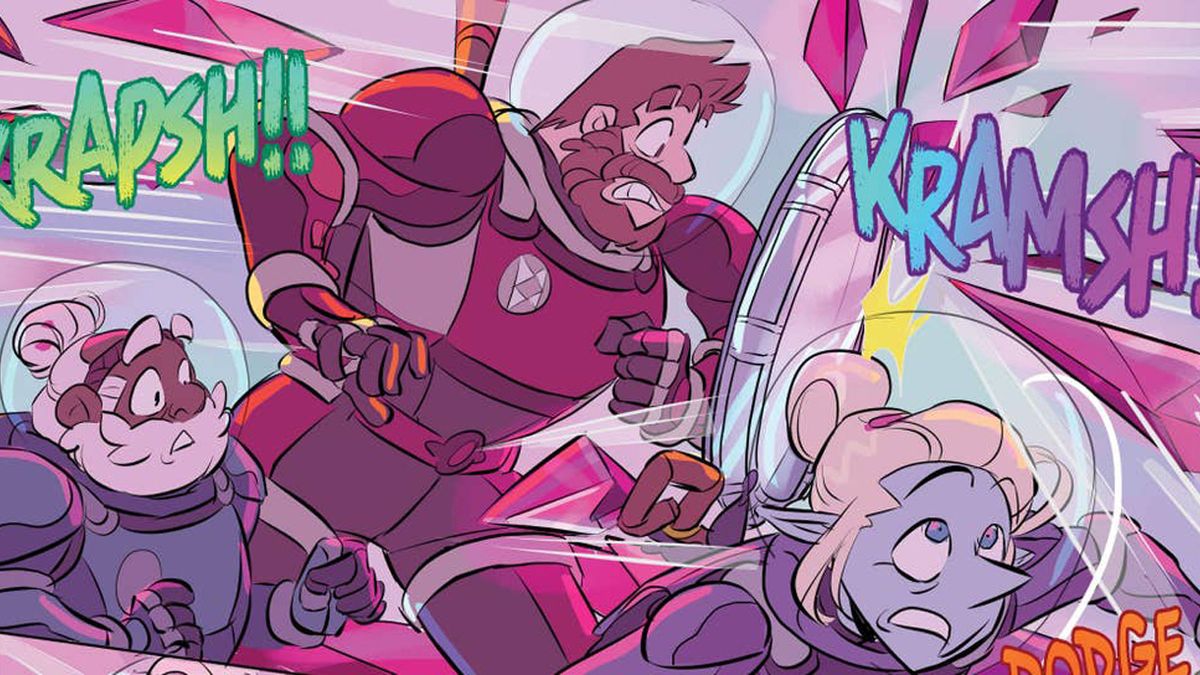
82 hours and six minutes. That's the runtime of the smash-hit first season of The Adventure Zone, a Dungeons & Dragons actual play podcast created by the McElroy brothers Justin, Travis, and Griffin, and their father Clint. Two and half years, 69 episodes, and 82 hours of goofs, gasps, and dice rolls, all created in an audio medium that developed a dedicated fanbase that led to sold-out, cosplay-packed live show audiences.
The Adventure Zone runs the gamut from dungeon crawls to The Fast & the Furious and even brief detours into other systems like Powered by the Apocalypse, but no matter the arc, the heart of the show is its narrative and the family-driven (though not always family-friendly!) humor of the gameplay, both in and out of character. That's what the McElroys and co-adaptor Carey Pietsch knew they had to bring to the table when they partnered with First Second to bring The Adventure Zone to life in a new medium: comics.
Now, three years and a three-for-three streak of #1 New York Times bestsellers later, The Adventure Zone graphic novels have become a world of their own, faithfully adapting the McElroys' narrative while still seizing the opportunity to build out the world and characters of Balance even beyond the podcast itself. The fourth installment, The Adventure Zone: The Crystal Kingdom hits shelves July 13 from First Second, and represents a new level of challenge not just for Magnus, Merle, and Taako, but for the McElroys and Carey Pietsch as well --as the Bureau boys take on their most dangerous mission yet, the Adventure Zone creative team face down adapting one of the most narratively dense arcs of the show.
Recently, Newsarama spoke with Clint and Griffin McElroy, artist and co-adaptor Carey Pietsch, and series editor Alison Wilgus about adapting The Adventure Zone into a series of best-selling graphic novels, and we talked about six brand new pages from The Adventure Zone: The Crystal Kingdom -- which you can see right here at Newsarama!
Newsarama: Now that you are four graphic novels deep in terms of writing the Adventure Zone books, what does this process look like for you in terms of actually creating the first draft? When you're thinking of the narrative for that specific book and how that book fits into the rest of Balance, how does that process go?
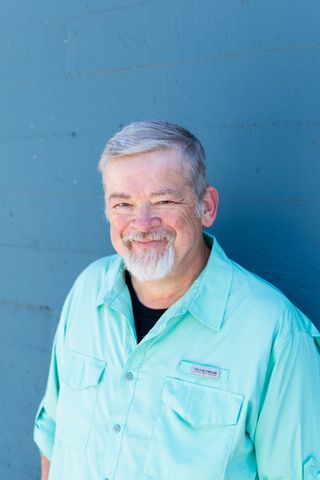
Clint McElroy: I think that one of the biggest changes, and it's not really a change, it's kind of evolved this way, is that we put a lot more front-work into the outline, which we're going to play off of, obviously. But I think we've put a lot of thought into the actual outline itself to layout… more than we've done – obviously more than we did in the first and the second, and then a little bit more than the third. But as we've progressed, that outline has become more in-depth, more expansive, and I think that has been a very, very positive change. It's made it work so well, but we've had to because the story is getting denser and more complicated as well.
Nrama: Carey, for you, when you get to the thumbnailing process, what does that part of it look like for you in terms of - I imagine going from a podcast to a graphic novel, a lot of the consideration for things that make it into a new format is 'How does this actually look when I try to draft it on a page?'
Comic deals, prizes and latest news
Get the best comic news, insights, opinions, analysis and more!

Carey Pietsch: Yeah, fair. I think I feel really lucky in that that is the sort of thing that the entire team is already thinking about at the outline stage as we were talking about. So when those earliest conversations are happening, because all the McElroys have now finished the 'Balance' arc, they can now have the benefit in hindsight, kind of, in of looking backward from the end to figure out not just what's going to need to be brought forward to flesh out an emotional arc or bring forward a character development that they know would eventually, theoretically play out towards the end of 'Balance,' but also what's going to work in the graphic novel version of that.
So that sort of thing is on everybody's mind from, thank God, before I ever put pencil to paper, because if the first time we ever thought about it was then, we would be in big, big trouble. But also, you're right that a big part of it is getting to layouts and figuring out at that point, 'Oh, maybe this moment needs to be broken into two pages, or there needs to be a translational beat between these two moments so that we can give this a little bit more room to breathe in comics format.'
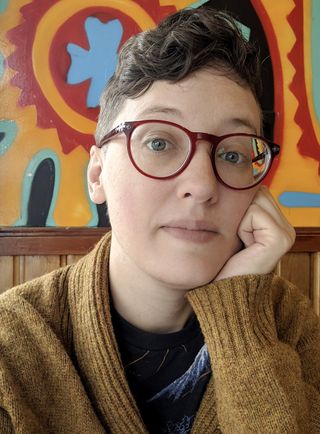
Alison Wilgus: And I think at this point, like Clint was saying, we spend a lot more time talking about this stuff in the outline. I think we have usually two or three calls, usually it's three of us talking through this stuff at the outline stage. And a lot of it also is figuring out the tone, because sometimes the tone of some of these scenes plays a lot differently than it does in the podcast for a lot of reasons. These characters living through this in the book is a little different than when people are kind of goofing around on the podcast. So it's interesting to see the path of those early conversations, and then by the time Carey's getting to the thumbnails, what are the big moments and what are the big emotional beats, a lot of that starts in conservations really, really early on in the process.
Nrama: Are there any moments you can think of where, Carey, maybe during thumbnails you hit a point where you realized, 'I don't know if this is going to work as well as we thought it might,' or you were able to go back and say,'I know we talked about not doing this, but I think actually I can find a way to make this work.'
Carey Pietsch: Oh, that's a fun question. Yes, there definitely have been, and I'm struggling to come back with any actual specifics. I think, without spoiling things too heavily for Crystal Kingdom, which isn't yet out at the time we're doing this interview, there was one small scene in Crystal Kingdom that's set within a larger scene that initially the larger scene – this is nonsense, I'm talking in such abstract terms. That doesn't mean anything to anyone.
Nrama: That's what makes it exciting. That's the fun of the comics industry, conversations about books that won't be out for two years.
Carey Pietsch: Right. Do your best with your crystal ball to figure out what we're going on about. But the larger scene got condensed and we figured out a way at the outline stage to kind of pluck the smaller play within a play out of that larger scene and move it to a new spot, and I think it works great where it ended up in the book.

Griffin McElroy: I helped write this book and I have no idea!
Nrama: Griffin, I am really curious to know what similarities there are between having DMed the full 'Balance' campaign and now trying to help shepherd that through the adaptation process?
Obviously, there were four of you involved in bringing this to life as a podcast, but the experience of putting the campaign together, you have a much different perspective on that, compared to what actually happens from session to session, and what turns out to be the final course of events. What has that experience been like for you compared to...
Griffin McElroy: No, I understand what you're asking because it's collaborative in both cases, right?
Nrama: Yeah.
Griffin McElroy: Yeah. It is dramatically different, I would say. DMing the show, you know, it was all of us recording it and making the show, but as DM I was very much in charge of the structure and set-pieces and general plotting of the thing, and I'm so proud of it and it was so, so satisfying to make, especially, making something like that with your family is incredible.
But at the same time, it was also kind of a lonely process because you don't know how it's going to go, on one hand, because it is improvised largely, but you don't know how your family's going to react to being in the situations that you put up. You don't know how the audience is going to react whenever they hear it. I didn't have a wide body of work to lean on to say, 'Oh, well, I've done stuff like this before, so I'm sure this one will turn out fine too.'
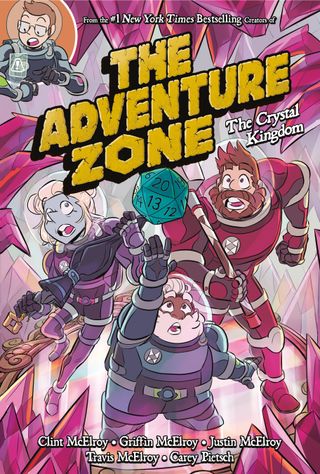
And at the end of the day, it's a goof podcast, so it was inherently also kind of easy, in that regard, to actually produce and release the thing, which is not true of books or also any other format of media that exists in the whole world.
But at this point, we've done this adaptation process a lot now, and it is the polar opposite of that, in that is it so top-down collaborative at every part of the process. It's not one person kind of setting the stage and dictating things and seeing how everyone else reacts, and also having the script already to go off of, is in some ways a blessing and a curse. A blessing because, you know, you don't have to pull stuff out of the ether full cloth, but also, you want to do good by that. But having that pressure on you with the help of people who you have now done this with – with Dad and with Alison and Carey and Justin and Travis and everyone – it's great, I don't know how else to put it.
Ali Wilgus: You've got allies in the narrative battlefield this time.
Griffin McElroy: That's exactly it, yeah. It's quite different but I've come to very much enjoy it.
Clint McElroy: It's become increasingly more difficult for me to take all the credit.
Griffin McElroy: Right.
Clint McElroy: That's been one of the downsides because now, you know.
Griffin McElroy: Book one, we could just kind of kick it and, you know, Dad's just carrying this thing over his shoulder across the finish line.
Clint McElroy: Can't do that anymore.
Griffin McElroy: No, his back is going.
Nrama: I'm curious if there are any moments where particularly you, Clint, as a player, where you've had the opportunity, over the course of four books, to stop and say, 'I wish I had been able to do something different with Merle,' or, like, 'I wish we'd been able to take this in a little different direction.'
I'm not asking about regrets, but hindsight's 20/20 always. If you're like, 'I wish I'd had more time to do this and now I have the time to devote to that in a graphic novel.'
Clint McElroy: Well, that has been a big plus as we've gone along, is the fact that we have been able to, not just flesh out Merle, Travis, and Taako - I mean, Merle, Magnus, and Taako, Freudian slip there - but the fact that we've been able to add some depth and some expansion to all the other characters. And that was one of the things that we made a definite decision early on to flesh out more of the other characters in the story, and I think that has been nice. I think we have to do a balancing job between wanting to fix what was broken, if it was broken, and also to still pay tribute to the things that made it such a great story and so much fun.
I'm not so worried about the plot, but to the point now where we say, 'Okay, how do we work that joke in?' And so that has changed a little bit, but I think the basic storyline – Griffin's arc was brilliant, in my opinion, and what happened in 'Balance' was terrific, and I think now we have, to steal from Carey's expressions, we have a bigger palette that we can work with to tell this story and expand some of the things we wanted to.
Ali Wilgus: I'd love to hear Carey and Griffin talk about this too, because I feel like a huge thing that really was a big deal with Crystal Kingdom was figuring out ways to incorporate those things that we really liked, even though the scene that it was in no longer existed, but we still wanted to have the moment. I feel like that was a big problem-solving thing, so I'm wondering if you can think of specific stuff where there was a little bit of monkeying around to preserve that kind of thing.
Griffin McElroy: It's so tricky because Crystal Kingdom was the most Dungeon-y arc I think we did. It was the most Dungeons & Dragons-y despite the sci-fi trappings of it. It was a series of combat and puzzle encounters, which, you don't get much more D&D-y than that. Maybe Suffering Game, but that was like Crystal Kingdom on hard mode. And there were a lot of great moments from the show during those different encounters, but not necessarily heavy narrative moments, that if we removed them, the story wouldn't make sense anymore.
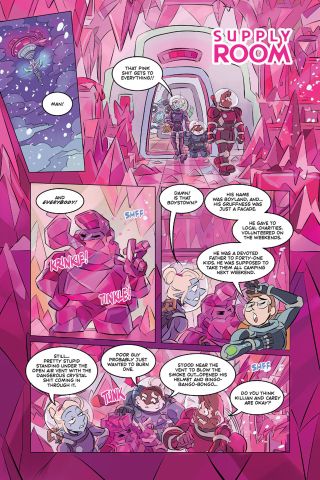
So that was the stuff that hit the cutting room floor, I feel like. Entire rooms which occupied like half an episode that just was a fun thing to happen in the episode and a fun challenge for Dad, Travis, and Justin to try to laterally think their way through, but we don't have the real estate for that in the books. But there were some great moments in there that then you just have to figure out: 'Okay, how do we recreate that, in a different scene?' And I feel like we had to do that quite a bit.
I feel like Kravitz was the fulcrum for a lot of this, because we definitely wanted to spend more time with Kravitz because he ends up being a much more important character than I think any of us assumed when we were recording Crystal Kingdom. But there were some scenes that we didn't have in this book because we were trying to trim it down. So that's the kind of stuff that comes to mind to me.
Carey Pietsch: Yeah, and I think as Griffin was saying, in the podcast, a lot of really fun character interactions happen during that kind of puzzle-solving or combat encounter, right? It's like when characters or the people playing them are having a side conversation while trying to figure out how to talk your way through a robot murder session. I think some of that ended up getting translated into conversations they have in different scenes, or into the body language and acting we were able to use to kind of convey the same growth and trusting relationships and just characters getting along better over the course of the book and time.
I am really excited about the ways we were able to - I'm doing the talking in circles around things again, but the ways we were able to give Kravitz more time to shine in the book, I am really excited about.
Ali Wilgus: And when in doubt, you just made a sign in the back of the lab that referenced something that was in the podcast.
Griffin McElroy: Yeah, there's a lot of that.
Ali Wilgus: A lot of elevator jokes kind of in the background.
Griffin McElroy: Well, another thing that kind of makes Crystal Kingdom – as long as we're talking in circles and wasting everybody's time – this story, this arc is where the whole kind of campaign, the whole story of Balance comes into view, and it does that through a scene that is so important to the show, but it is also, like, a big thing. It's a big chunk of exposition, and I think cool exposition, but we had this anchor, kind of, to structure the rest of the book around. Because we were like, 'Well, we gotta have the Cosmoscope scene' is what it is. I don't know why I have to be abstract about that. We have to give that the space it needs, because without that, then this book doesn't exist. Without that, the rest of the story for the whole thing doesn't make any sense.
Clint McElroy: It's the origin story, almost.
Griffin McElroy: Right, so I think a lot of those decisions had to be made in the interest of keeping that section of the book from being trimmed down too much. And everything else we could kind of then portion the pages out to.
Ali Wilgus: Griffin, do you remember the panel description in there where you described the entire known universe, and then highlighted to leave a comment being like, "Have fun, Carey!"
Griffin McElroy: Right, I think the line was, there's a line where they're zooming out through existence and they're like, "And here it is, the entire observable universe."
Carey Pietsch: That's it.
Griffin McElroy: And I remember being like, "Carey has to draw that."
Clint McElroy: Our notes are always of two varieties. One is "have fun with this, Carey!" or "really sorry about this, Carey."
Carey Pietsch: Sometimes they're the same note.
Griffin McElroy: Right.
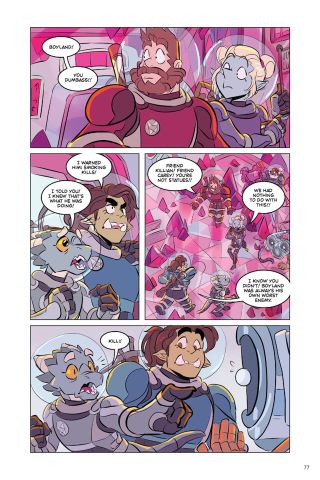
Nrama: Carey, just hypothetically speaking, or I guess realistically speaking because Petals to the Metal is already out: which concept is worse, the concept of you having to reproduce the entire known universe or the concept of you having to produce 12 to 16 moving vehicles?
Carey Pietsch: This is a great question, and I feel like the only way to address it would be for me to sit down and draw them both again, but like one with each hand simultaneously, which would physically break me in twain and therefore we'll just never know.
Nrama: Well, I think that's a really good segue into the excerpt. In the excerpt, Merle and Taako and Magnus coming across the recently departed Boyland, and Carey and Killian appear shortly after, and reveal that they have, in fact, been fighting giant tardigrades in zero gravity.
I think this excerpt really encapsulated a lot of the things that are so fascinating to me about adapting these things between mediums. I think the most obvious one is condensing the tardigrade fight into the conversation with Carey and Killian, and also the way that for Merle specifically, you expanded a little bit the Boyland scene and the scene where Merle encounters the crystal.
Can you talk a little bit about the decisions behind condensing those things, specifically?
Clint McElroy: Well, let me take the unexpected tack of the fact that the tardigrade fight is an example of what we were talking about a few minutes ago. We reached the point where we didn't need the zero-gravity fight with the tardigrades, and I hated that because I loved the idea of the giant tardigrades. And so then one of the things that when we were doing the podcast is that it was very linear in that fact that we were playing it from the three characters' point of view, and couldn't really focus on side stories that were going on, and this gave us a chance to show off Killian and Carey in battle and also to still save the tardigrades and provide kind of that expanded scope of showing other stories going on.
Ali Wilgus: I feel like this scene is also a really great example of a lot of what ended up happening during the adaptation, because I feel like very early on a lot of the conversation was, 'Who are the most important characters in this book?', 'What is the actual plot that we care about?,' and 'What stuff is supporting that and what stuff is not?'
And so we kind of got rid of almost everything that wasn't directly supporting the plot and then, like we were talking about, we'd find ways to incorporate it a little bit. But what that ended up doing was sometimes as we were chunking it up, we sometimes ended up with bits that didn't quite match each other. Transitional scenes were the hardest, where two scenes, there originally was a bunch of stuff that had happened in between them that now didn't exist anymore, and so we ended up with things like, okay, physically, where are they? Where are Carey and Killian? When are they meeting back up?
I think it's invisible in the scene now, but originally there were a lot of logic problems. We'd end up having people jump in and out of scenes and we'd lose track of where people were, but the nice thing is that, in solving that we then had these very elegant solutions of, oh, they'll meet up with Carey and Killian, and then while they're distracted Merle can be getting talked to by this mysterious glowing light that's trying to get him to touch a crystal. We solved two problems at the same time. It's easy to forget this after you solve the problem, but going up into that there was a lot of, are we going to keep this fight scene? Why don't they stop Merle from talking to the crystal? What's going on? It's like a whole chaos cloud condenses into what ends up being a very tight scene. We had to do a lot of that in this book.
Nrama: Carey, I feel like your panel layout there is super-efficient, and so if you're coming to the graphic novels as a listener of the podcast, the layout of having this background snapshot of Carey and Killian's fight and having everybody peeking through the bubbles around it still maintains that audience element, and transitions really effectively so it doesn't feel like there's anything missing. It's just like, 'Oh, this is a really cool scene about Carey and Killian.'
Have you found that there are opportunities to use paneling and layouts and working with Tess Stone on the lettering to help navigate that, or sort of help find ways to maintain that feel of the vibe of the podcast as you're laying things out?
Carey Pietsch: Yeah, absolutely. I think even going back to the very first book, there was a page in the script that was the travel montage page, which really kicked off me for sure starting to think about where else can we incorporate this. I think the rest of the team obviously had been thinking about that since minute zero as a way to do that kind of elegant condensing.
There is so much happening in the podcast and we are able, as Clint was saying, to kind of turn the camera lens and look at what's happening outside of the three main characters' perspectives because we have a literal broader scope. So techniques like montaging several characters moving around within a single panel to show you the passing of time, and also they get to do a bunch of cool flips within the space of one panel because we are short on pages, there's definitely a lot of that as we move along in the books.
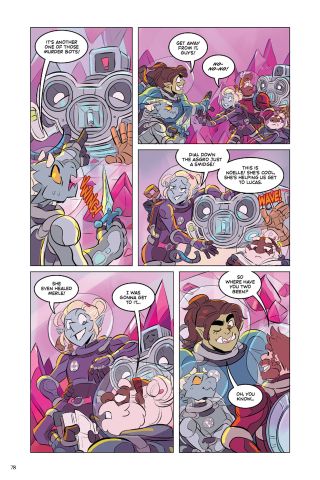
Nrama: How exciting was it to get to reintroduce Carey Fangbattle? I think she pops up really briefly in the first one when they're coming to the base for the first time. What was it like to get to bring her back in full force?
Carey Pietsch: A delight. I obviously am biased, but I do love her. I think I have snuck her into all three graphic novels so far, but it's great, it's great.
Ali Wilgus: It's important!
Carey Pietsch: She's a tiny gay dragon lady, I'm a tiny gay dragon lady, we have a lot in common.
Nrama: It's your artistic prerogative. That's your right as the co-adaptor.
In terms of both the set pieces - what are the challenges between adapting an arc like Petals to the Metal versus Crystal Kingdom where the raw amount of material you're working with is about the same, but Petals is so dominated by one very, very long action set piece, versus Crystal Kingdom where there's a lot of action happening, but it's dominated by the volume of information they're going to get by the end of it.
Griffin McElroy: Right, it's two different writing challenges, where in Petals to the Metal we knew what we had to write and then it was a question of how can we do this the best way imaginable? How can we do right by this big action set piece, and also this romance plotline that is at the very heart of Petals to the Metal, whereas in Crystal Kingdom it was almost the reverse, which is we didn't necessarily know what to write. There's a lot that happens in Crystal Kingdom in the podcast, and we knew that some of that stuff was going to have to get cut. Maybe you could argue that the scene in the Cosmoscope is the center point of the thing, but then the thing moves on and now we have to get our hands dirty in the arc itself and that was a lot trickier, honestly.
I feel like it was much harder to smooth out Crystal Kingdom than it was to flesh out Petals to the Metal, if that makes sense. It was a cool challenge to take on because it sort of showed me new angles on this story that I ostensibly told with my family when we did the podcast. It clarified it in a lot of ways, as one might clarify butter, and it's really very, very cool to see a story that you have told shift like that. It's very cool. I highly recommend it!
Ali Wilgus: Am I remembering correctly that Justin made a joke at one point about,"Maybe finally I will understand what Crystal Kingdom was about and what happened in it?"
Griffin McElroy: Yeah. I mean, from a big picture perspective it's a fairly straightforward 'monster of the week,' if you want to call it that, thing of just trying to survive this weird lab, but that's not enough to really hang your hat on for what a book is about. This is the center point of the entire campaign, so at this point it's like, well we've got to start setting up the whole thing, but how you do that and also tell a standalone story that in a vacuum is cool and good. I think in the podcast, Crystal Kingdom did a very good job of the first thing but could have been focused a little bit more on the second thing too, and I think with the book we could do that.
Ali Wilgus: I'm going to be insufferable uncle editor for a second here.
I think my favorite thing about watching Crystal Kingdom go from the raw podcast and us talking about it to the book in terms of the adaptation process is, Griffin, I feel like in the podcast when I was re-listening to it, the interesting core story of the Millers and their lab and what's going on with that is really cool and interesting, but because it's this very long podcast that has all the dungeons, I think that it was hard to keep the players focused on, 'Okay, I get you're fighting a tardigrade right now, but this is really a story about grief. Stay with me here.'
Griffin McElroy: Right, yeah!
Ali Wilgus: And it was interesting once you took all that other stuff out and started having to make those difficult choices about what to keep… I think the fear when we first started talking about this was that it would be hard to do the story justice with taking so much stuff out of it, but I feel like the opposite happened, where I feel like everybody got to see what a cool story you'd actually told because it was focusing more in on the core of what was most important about it, and it just really polished it to a much higher shine in a way that was really cool to see.
Griffin McElroy: That's very kind and I appreciate that, but I feel like it wasn't just, you know, we put up a new lens on the story that was told in the podcast. We added stuff and there is new stuff, because I think we got to the end of maybe even a second draft, we were in it when we kind of realized, this is kind of impersonal. It checks the boxes and does the things that we need this book to do, but considering that Petals to the Metal is extremely personal and is, in fact, kind of the part of the podcast where we allowed ourselves to feel comfortable telling personal stories.
And then we kind of followed that up with a necessary cool set-piece and necessary world-building for the big picture thing. I think some of that personal stuff got maybe a little bit lost along the way, and in this adaptation, the way we were able to focus it did a lot of work, but also there are whole cloth new scenes in here that helped us find what the thing is and find what the story is about.
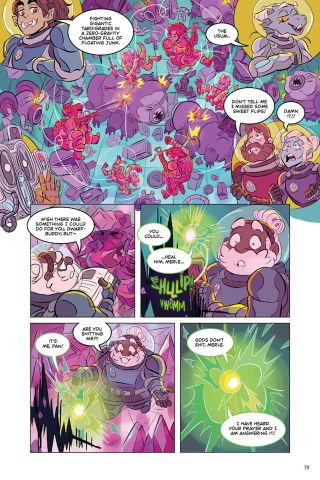
Nrama: You were able to bring music to the forefront of the podcast in Crystal Kingdom, and I'm curious about how you incorporated the crystal minuet moments throughout the graphic novel.
Griffin McElroy: Yeah, I mean that was a difficult decision to make. One of the most difficult, I would say, of the book, because a big reason why Crystal Kingdom was the story that it was is because I was into vocaloids when we were doing the podcast.
I'm not saying I was going to Hatsune Miku concerts and stuff like that, but I bought a vocaloid because I thought that they sounded cool, and I was covering songs with the vocaloid and just trying to learn the ins and outs of how it worked. And that was about the same time that I started doing music for [the podcast], at the tail end of Petals to the Metal, so those two things really dovetailed quite nicely into essentially a vocaloid character in Crystal Kingdom.
But - and this is something that not a lot of people actually know, is that books don't has music. Books can't do music, unless it's one of those greeting card books or one of my child's books where you press the button and it makes a duck sound.
Clint McElroy: Marketing breakthrough!
Griffin McElroy: That would be huge.
So there's definitely less of it, I will say that, in the book, largely for that very reason, but also because, it is a thing that happens in the audio medium of the podcast that is a very cool, weird, off-putting audible thing but it didn't necessarily have an extremely great reason for happening. It was just cool, and it was a creepy harbinger of bad stuff's about to happen.
And so trimming the aspect of music down in the book, while it's kind of sad to see something that cool in the podcast not be as important in the books, that is just the nature of different mediums. We had to be okay with that.
But it is still in the book in a way that I think is pretty rad and maybe confusing to people who didn't listen to the podcast, but we hit a point where we were like, 'We don't care! We gotta have it in there!' and it is where I think it needs to be. I'm happy with it.
Carey Pietsch: Yeah. I also really miss the music from the podcast, both in and of itself as really cool pieces, and also as a way to set tone and establish feeling and kind of give you that sense of what a scene is going to be about – I mean, literally setting the scene.
I remember that one of the big conversations we had very early on when we were talking about 'what can be done about this' was to dissect kind of what were the other purposes that the music was serving, and a lot of it was, exactly as Griffin was saying, was warning you that something terrible might be about to happen here, and giving you that sense of mystery and setting the genre flavor of the podcast.
We did talk a lot about, well, what are the other ways that we can bring forward that sense of mystery, and that you're hunting after a big secret at the center of the lab, and I think a lot of that ended up coming through in additional scenes and also the ways that some of the other characters got fleshed out, the Millers especially, which I am very excited for people to read.
Ali Wilgus: I feel like we had a lot of extremely serious conversations about, what does it mean? And who literally is singing? It was like we were having a lot of very in-depth conversations about vocaloid music, which is, that's how I want to live my life, so that's good.
Clint McElroy: And you know, in the '60s, cereal manufacturers would put records on the back of the cereal boxes for like, the Archies. I wonder if we could embed something on the back cover – now here me out, Ali! – put something on the back cover. Of course, then people would have to remove it and buy another copy for reference. I'll talk to the powers that be.
Nrama: To go back to the individual arcs versus the overall narrative, when you are drafting the books for the first time, how do you approach that? Are you thinking about it specifically as, 'what are the big moments that I can call to mind first to flesh out from there,' or have you had to start thinking about it more in terms of what is the overall story that moves forward in this part of the book, and what from the show am I going to include to continue to serve that?
Clint McElroy: That's why we have Ali.
Griffin McElroy: Yeah.
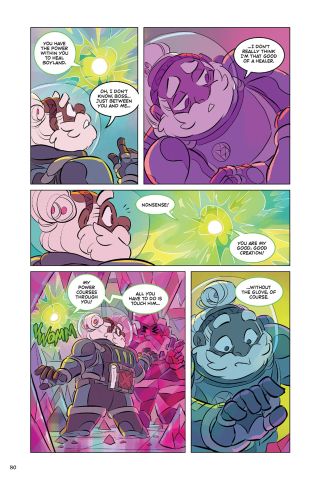
Nrama: That's my Ali question.
Clint McElroy: And I say that in jest, but in serious point, the beauty of doing these books with Carey and Ali and Calista Brlll and the people who are involved in the process is the fact that they love the story as much as - although probably more than we do, and they know the story inside and out, and so that's why we have conversations with 'Oh, I would hate to lose that' or 'We need to have that in there." I think that combined with Carey's affection for the story and Ali's devotion to the story -
Griffin McElroy: That's a weird way of putting it.
Clint McElroy: They are totally –
Nrama: Passionate.
Clint McElroy: They are very passionate about it. But seriously, I mean, that way we are able to keep that, and that's why the outlines are more in-depth, it's because those things - I mean, when we first started it was three goofballs and the younger brother who was trying to make them do stuff, and those three goofballs did everything possible to screw up this beautiful story Griffin's trying to tell. And that's the truth! That was our motivation. And then something happens in this book that for me personally completely changed the way that I, you know, I'm not going to drop a spoiler, but completely changed the way that I looked at Merle and the way that Merle played, so we've had the opportunity to see that a little bit as we've gone through these last couple of books.
The incident that happens in the book was a major turning point for me, because it created conflict between two of the main characters that kind of lasted for a while.
I had a revelation in Petals to the Metal towards the end, with the big race, and this is in the podcasting version of it, where it was just flowing and we had it going and everybody, the pace, and the energy was great, and oh man, and at that point I said, 'Man, this would be a great movie, this would be a great graphic novel,' and then there's a moment in this book where it changed for me, where I went, 'Wait a minute, this is a little more than just goofs,' and that was an important moment for Merle and for me.
Carey Pietsch: I think from the minute we started talking about this as an outline, I was excited about how much of an arc Merle has in the podcast already, and I think we got to give him a little more emotional room to kind of work through some of that on the page in a way that I think plays really well. In the podcast already, there is so much of a story there, and kind of a journey he's going on within this arc alone, let alone touching on what he goes through over the course of the campaign, so I'm really, really excited with where that landed on.
Nrama: In the course of adapting the podcast to the graphic novels, has there been any particular moment that you were either excited to revisit or to add, if there's something new that's been included?
Just some final thoughts on what this whole process has been like and how it's sort of changed your perspective on both the process of writing graphic novels as you go along, and maybe reflecting on the show?
Griffin McElroy: I will kind of perennially give my answer of the Director. We know a lot more about her at the end of the campaign, and there are lots of moments in every book so far that, looking at them now would be kind of ghoulish without her sort of having some reaction to one thing or another. We definitely get that in this book, as well as the sort of shadowy antagonist that has kind of popped up throughout the books is a more complex character than, 'I'm a spooky bad guy!'
Being able to flesh out those two characters, in particular, is super satisfying.
For this book specifically, there's a whole scene that we added to try and tell this more personal story and that's the thing I'm proudest of in this book. I think it changes the whole thing, and that's the kind of opportunity that we have with these books that gets me excited.
Ali Wilgus: I remember when you added that scene, I think I literally clapped my little hands together after I finished reading it, like, 'Yes! This is the good shit!'
Clint McElroy: For me, I really and truly – and I say this every book – I love the finales of every book and I love, love, love the end of this book. I have looked forward to it and I'm very excited about people seeing the ending.
Griffin McElroy: There's so much rad shit at the end of this book that I can't, I honestly don't know – I guess we try to do that from every arc, especially from Crystal Kingdom on, of trying to have a big 'whoa!,' a big button on it.
Carey Pietsch: I think I'm with Griffin in that seeing the Director have more room to kind of be an entire character early on, which obviously she is by the time you get to the end of the campaign.
But I think this is another case where the McElroys' benefit of hindsight has allowed them to give her room to be that from minute one, which is really satisfying. And then my 'rubs my little raccoon paws together good shit' is always that we get to do really juicy emotional mess, so there's a lot of that in Crystal Kingdom.
I think Hurley and Sloane in Petals to the Metal and then Kravitz and the Millers in Crystal Kingdom have been some of my favorite arcs to see get more fleshed out.
Ali Wilgus: I think I just really so enjoy the process of working on these books, and it's such a privilege to get to work with such talented, thoughtful people.
There were several moments in Crystal Kingdom specifically - I was just talking about when Griffin wrote a new scene from scratch out of nowhere and kind of blew us all away with it.
I remember when we were in thumbnails there was a page that Carey has already taken from being a couple of panels to turning into its own page because we already were like, 'this is a big moment, this needs to have its own page.'
And then I remember there was an editorial call where I think it was Justin was like, 'I really think we need to tweak the dialogue on this page,' because this is already a bigger moment than it was in the podcast, and then Carey has made it an even bigger moment from the script.
The script upped the ante, and then Carey's art upped the ante, and Justin's like, "I feel like the script that we wrote is no longer doing justice to this moment on the page," so we spent like 15 minutes talking about this on the phone, and now I feel like that page has made me cry no less than six times over the last calendar year.
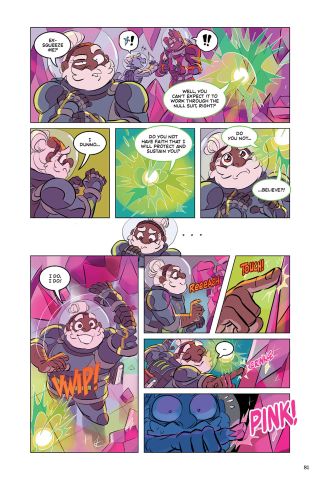
Things like that happen all the time working on these books, and over the course of working on them as we've all gotten to know each other better and we've learned to kind of trust each other as collaborators... I hope it's similar for you guys. It's very exciting to see a book like this come together.
Griffin McElroy: I was just laughing because I remembered that Dad at one point wanted to include a centerfold fold-out of the Cosmoscope, which is a –
Clint McElroy: Hey, I was going to ask for that again in the next book!
Griffin McElroy: It's a rad and powerful idea, but, yeah.
Clint McElroy: I do have to add one thing, in my defense – no, not in my defense.
We've been talking about basically our input. The input of Travis and Justin is – I mean, I almost am embarrassed that this is the first time we've been bringing up their names, but the fact is that they are just as involved in this creation and this collaboration. We may be doing a little more about laying out the groundwork, but they created these characters and they are just as invested in making these graphic novels amazing and have just as much credit coming to them because of the work that they do. We go over these books and go over these books and go over these books and go over these books and it's definitely a fair and balanced collaboration.
Check out our list of the best digital comics readers for Android and iOS devices.

